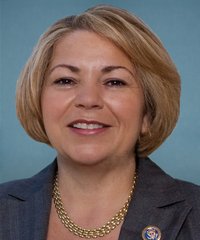
A former labor lawyer, Linda T. Sánchez represents California’s 38th congressional district – but the first thing her family and friends will tell you is that she’s never stopped “kicking ass for the working class.” Most of all, she is also a proud mom, dog lover, and Dodgers fan.
Elected to the U.S. House of Representatives in 2002, Sánchez is the first Latina to serve on the powerful House Committee on Ways and Means and the House Judiciary Committee. A lifelong progressive, Sánchez has devoted her career to helping working people get ahead: advocating for families, improving America’s education system, and bringing jobs to Southern California.
As a card-carrying member of the International Brotherhood of Electrical Workers (IBEW) Local 441 and former labor lawyer, I am a staunch defender of worker’s rights. As your representative in Congress, I am fighting every day to improve working conditions and protect the rights of workers in our community and across the country. I am committed to fighting for legislation that will increase project labor agreements, raise the minimum wage, ensure Davis-Bacon Act protections, protect the Jones Act, and expand the National Labor Relations Act. In addition, I am proud to be a Co-Chair of the Congressional Labor Caucus, and a founding member of the Labor and Working Families Caucus.
I have fought my entire career to protect working families by developing and implementing a pro-labor agenda. Unfortunately, there has been many attacks to gut commonsense policies that protect good jobs for working families. Jobs give us the security and freedom to take care of our families and give back to our communities.  Jobs are about dignity, and I will continue to protect hard-won progress.
With a combined history of work in the labor movement and membership on the Committee on Ways and Means, which has jurisdiction over our federal trade policy, I bring a unique perspective to international trade issues. I use my position on the Ways and Means Committee to advocate for fair trade policies and a fair level playing field for U.S. workers and businesses competing in the global marketplace. When done right, trade can spur innovation, create jobs across our region and country, and bring the “Made in the USA” label to more countries around the world. It is through this lens that I approach the trade issues that come before Congress.
During my time in Congress I fought to ensure that trade agreements reflect our national priorities and will continue to work tirelessly to improve our trade agreements. Specifically, I am an advocate for improved labor rights, environmental protections, Buy America provisions, and civil rights equality as the United States undertakes trade negotiations with potential partners.
Recently, I was honored to serve on the Conference Committee for the Trade Facilitation and Trade Enforcement Act. As part of that process, I was able to collaborate with members of the House and Senate to reach a compromise and bicameral agreement on our nation’s customs’ trade functions. Included in the final customs bill was the bulk of the ENFORCE Act that I have championed for several years.
Under the ENFORCE Act, domestic producers will be able to petition U.S. Customs and Border Protection (CBP) to investigate possible anti-dumping and countervailing duty evasions. For far too long, U.S. manufacturers have been hurt by foreign competitors and their fraudulent schemes to avoid paying the duties they owe on manufactured goods. The ENFORCE Act also puts in place timelines for CBP to make preliminary and final determinations about whether an importer is engaged in duty evasion.
I have also introduced an amendment to the Trade Priorities and Accountability (TPA) Act, which would have prohibited the U.S. from entering into trade deals with countries whose laws call for the imprisonment, torture, or even death penalty for the supposed "crime" of sexual orientation. I also joined with over 100 bipartisan Members of Congress calling for the suspension of Brunei from the pending Trans Pacific Partnership (TPP) negotiations until the country rescinds a new criminal code that violates the human rights of LGBT individuals.